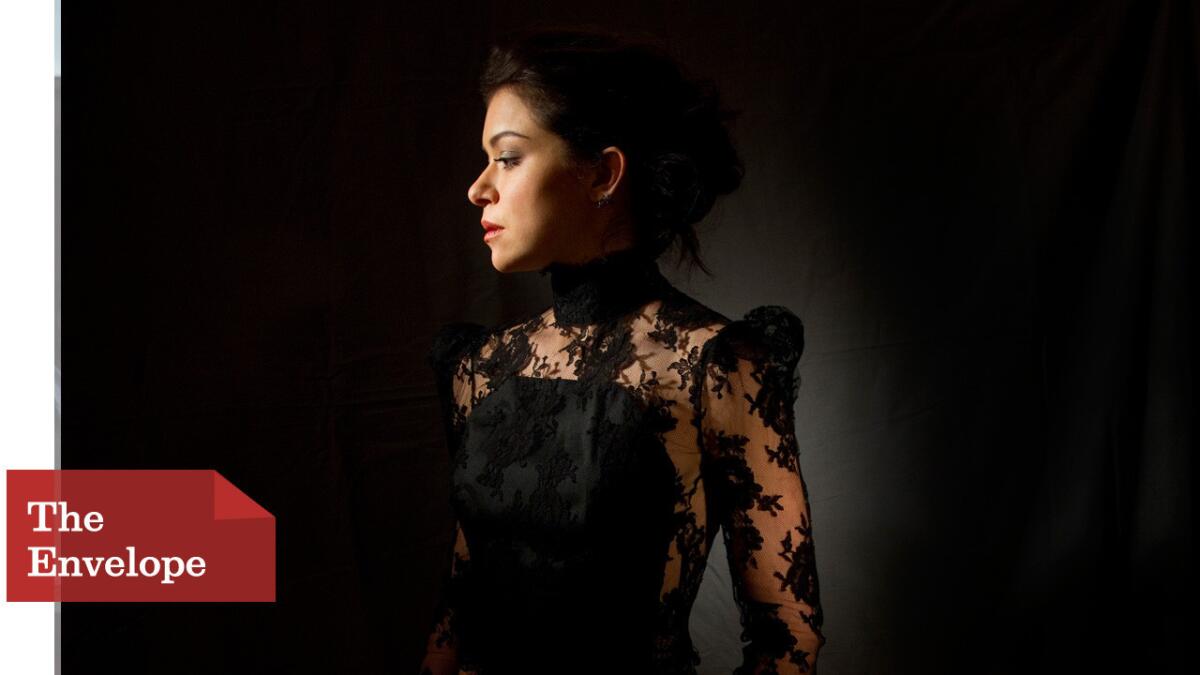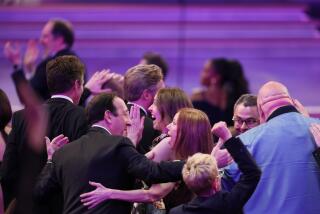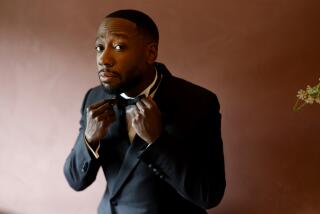Q&A: ‘Orphan Black’s’ Tatiana Maslany: ‘Honored’ for Emmy nod; surprised by Internet’s ‘nutty’ reaction

Tatiana Maslany has been nominated for an Emmy Award for her leading roles in BBC’s clone drama, “Orphan Black.”
Fans of Tatiana Maslany, prepared for more disappointment following back-to-back snubs by Emmy voters in recent years, were pleasantly surprised last month when the star of “Orphan Black” finally scored a nomination for her performance in the BBC America cult hit.
Make that performances, plural: Maslany portrays enough characters on the show, an inventive sci-fi series about human cloning, to single-handedly populate an entire category at the Emmys. Her one-woman ensemble includes Helena, a frizzy-haired Ukrainian religious fanatic; Alison, a tightly wound housewife from suburban Toronto; Sarah, a small-time con artist with a Cockney accent; Cosima, a dreadlocked lesbian scientist; and Rachel, an icy corporate executive with an Anna Wintour bob and the posh diction to match.
Now Maslany is competing in one of Emmy’s most fiercely competitive categories, lead actress in a drama series, along with the likes of Claire Danes and Viola Davis. Not bad for a girl from Saskatchewan.
SIGN UP for the free Indie Focus movies newsletter >>
We recently caught up with the actress via Skype from London, where she’s enjoying some downtime before she returns to work on Season 4 of “Orphan Black.”
The Internet was very, very happy that you were nominated.
It’s nuts to me that people care that much about whether I get a nomination or not. It’s a super-huge honor. Just the women in that category are unbelievable. I just feel lucky to be in that group, I can’t believe I’m part of that.
Had you written it off, or were you still hopeful?
It honestly just didn’t factor in for me. When the Emmy nominations would come out, that was the only time I was aware. It was never anything I was expecting by any means. For us, it was actually great publicity. People now know about the show. It was nice to be nominated but more so to have that kind of support from the fans.
Each season has introduced a new clone or two. What’s the process like for coming up with these new characters? Do you collaborate with [show runners] Graeme Manson and John Fawcett?
It’s definitely a collaboration, but it’s different every time. Krystal was different because she was meant to die in the first episode. I was really into “Kroll Show” at the time. And I was doing [a voice inspired by the characters in the recurring sketch] PubLIZity. I was wandering around the set as Krystal in that voice, and they were, like, “We can’t kill her.” Then we started to develop her into a full character and not just me doing Jenny Slate.
Rachel was somebody we discussed near the end of the first season — we’re going to have this corporate clone. The U.K. just has such a strong sense of class, and I thought, well, who better to go against Sarah than somebody who is entitled and affluent and had everything handed to her?
Has the show made you think about nature versus nurture?
Absolutely. I find it totally fascinating for one person’s genetics to have all these different outcomes depending on how they were raised or what the conditions in the womb were. The science of it is so human and psychological. It’s about personality and how we express ourselves in the world. For me it’s just a delicious banquet of possibility. [Laughs.] That was so cheesy, but there’s so much there to play with.
FULL COVERAGE: Emmy nominations
There’s probably not a lot of research to do since there aren’t a lot of clones running around ... that we know of.
We have a science consultant. Her name’s Cosima. The character [Cosima, the dreadlocked scientist clone] is based on her. She gave us like a Clone 101 first season. She definitely helps steer the story in terms of the science but lets us theorize and go off and make things up as long as they’re kind of grounded. She’s definitely been helpful. Research in twins versus clones is so interesting to me because there is such a difference in being raised in the same womb versus being raised in different wombs. There’s a lot of information that’s passed there. You think of the influence of the mother’s biology, the person who carries the baby or what the conditions of her birth were. It’s really fascinating.
You have a background in improv. I’m wondering how you put that to use in a show in which everything has to be mapped out pretty precisely.
There’s definitely a strong structure to things, in terms of blocking and how I’m going to react. That’s been the big challenge, and the joy for me is finding surprise in it and being able to not improvise necessarily but always allowing things to shift, even in subtle little ways. Improv taught me so much about creating a character based on one idea... also about creating a person across from me that isn’t there. So often in improv, you’re on a blank stage and you’re creating everything for the audience. You have to be specific about what you’re holding in your hands or who you’re talking to. In those scenes [in “Orphan Black’] when I have nobody acting across from me, I really have to be a child and play make-believe in a way.
You must have a very busy stand-in.
She’s amazing. She’s actually way more than a stand-in. Her name’s Kathryn Alexandre. All of the accents, all of the character work, she has inhabited, the walks and the physicality. She watches all the dailies to make sure that she’s still on track with how I’m acting and moving as the characters. And she also improvises with me. She’s amazing.
On top of playing a number of characters, you sometimes play one character pretending to be another. How do you go about layering those performances?
It’s one of the most fun things that I get to do on that show, because there’s so much room for inventing what it is, depending on who’s playing who. Sarah’s a much better actor than Cosima is. Cosima playing Alison is a disaster, but Sarah can get away with playing Rachel in a way because she’s just more manipulative. I enjoy playing with that. For me, it’s always about making sure the base character, whoever is doing the acting, is strong and let them play the character. Let them try their best. Let Sarah try her best to be Rachel, and let all the cracks show and all the mistakes happen.
The show is dense plot-wise. Do you have the writers map it out for you?
Honestly, I am absolutely lost when it comes to plot. It does not stick for me. So I really just have to be in the moment and ask questions and make sure that I’m reacting honestly. None of the clones really know what’s going on; they’re all discovering things for the first time. I know the scripts inside-out, but the plot stuff — I get lost.
Any of the clones you’d like to see get her own spinoff?
Alison. She and Helena are probably the most fun to play. The possibilities for their emotional life are just endless. It feels like a different movie when we’re shooting Alison. Me and Kristian [Bruun], who plays [Alison’s husband] Donnie, we do a lot of improv. The twerking [in Season 3’s episode, “Certain Agony of the Battlefield”] came out of us just dancing on set one day between takes. There’s a lot of lightness when we get to do Alison stuff — versus like Sarah and Helena, it’s always a bit darker.
“Orphan Black” has attracted fans beyond the usual sci-fi audience. Why do you think that is?
For me, I would watch this show for its dissection of how our culture looks at women and their bodies. Reproductive rights are at the forefront of news right now ... we’re standing up and saying, “This isn’t right, and who are you to tell me what to do with my body?” “Orphan Black,” whether it’s subtle or not, really speaks to that. Also, TV is just led by women right now, and that’s what people want and they’re hungry for.
Is there anyone you’re excited to see at the Emmys next month?
Amy Schumer. I’m a huge fan of her. She’s amazing. There are a lot of the comedians right now I’m watching. “Key & Peele,” even though it’s two guys, it’s a super-feminist show as well, and they always sneak in a sketch that’s really pro-female. It’s a really interesting time for comedy.
Do you want to do more of it?
I don’t get to do it very often, but I absolutely love it. It’s my favorite thing in the world to watch.
What was the audition process like for “Orphan Black”?
It was like a theater sports thing. I ended up having to do Sarah-as-Beth, Cosima and Alison in front of all these execs in a kind of rapid-fire way. “Do the scene a few times as Sarah now. OK, great, let’s see Sarah as Beth.” I’d put on a little blazer and try to transition in front of them.
You played a young version of Helen Mirren’s character in “Woman in Gold” and spoke German. What was that experience like?
It was amazing. I grew up speaking German when I was very, very young. My mom and my dad are both fluent. It’s been in my head a lot. But having to act through that filter was really interesting … for me it took away the self-consciousness of language. It took away the way I was listening to myself, and it became so much more about the intention than the way things sounded. When I’m speaking in English, I can’t help but hear myself, but when I’m speaking German, there’s a different part of my brain that’s open. I’d love to work in other languages more.
Maybe you can do your next film in Mandarin.
Right — something easy.
MORE:
When Jon Hamm became Matthew Weiner’s ‘Mad Men’ pitchman
Viola Davis and Cicely Tyson on the ‘blackest’ moment on TV from ‘HTGAWM’
For Emmy nominee Keegan-Michael Key, ‘supporting’ is the way to go
More to Read
From the Oscars to the Emmys.
Get the Envelope newsletter for exclusive awards season coverage, behind-the-scenes stories from the Envelope podcast and columnist Glenn Whipp’s must-read analysis.
You may occasionally receive promotional content from the Los Angeles Times.








